Assistant Professor of Human Resource Development (HRD) Tomika W. Greer has been recognized with the Excellence in Critical HRD award at this year's Academy of Human Resource Development (AHRD) international research conference in Virginia.
Her recently published textbook, Human Resource Development: Critical Perspectives and Practices (co-authored with Laura L. Bierema, Jamie L. Callahan, Carole J. Elliott and Joshua C. Collins), was also named HRD Book of the Year.
"This [Excellence in Critical HRD] award is in recognition of me, as an individual, having reached a professional milestone in building a career in critical HRD by bringing critical perspectives into my research, service, and teaching," Greer said.
Critical perspectives were not always Greer's approach of choice when it came to solving problems.
"My background is in engineering, so I'm used to a world where we work a problem, circle the answer down at the bottom of the page, and are either right or wrong,” she said. “With critical perspectives, there's not always a 'right' or 'wrong' way to do or approach something, so I was almost repelled by this concept at first.”
"I grew up with an engineer as a dad. I'm married to an engineer. I have a bachelor's degree in engineering. Human Resource Development can seem like something totally outside the scope of my engineering background, but I'm living proof that there are definite connections between engineering and HRD. HRD, like engineering, is very systematic and process-driven. We deal with human processes more so than technical processes or reactions, but it is a science."
In a unique twist of fate, Greer was a member of the awards committee that originally established the Excellence in Critical HRD award several years ago, before she even considered herself a critical scholar.
"I had no idea that I would be receiving this award one day,” she said. “This award truly solidifies my identity as a critical scholar — realizing that now I'm accepted and recognized as one and feeling a responsibility to uphold the ideals of critical HRD further. I've been recognized for this, so I want to make sure I continue to do that identity justice."
Greer's textbook is just one example of her commitment to those ideals.
"I joined the textbook project in 2020, the week before everything shut down, so we wrote most of this book during turbulent pandemic times. It was a long and very difficult period, but I think the lingering personal and societal challenges strengthened the book. There was a lot to think about in terms of critical HRD during the pandemic," Greer said. "My co-authors and I were spread across several different time zones in the UK, Houston, Georgia, and Minnesota, so we got on Zoom for a few hours once a week for a virtual writing retreat where we also encouraged each other to keep making progress on our chapters."
Collaborating during the weekly writing retreats allowed Greer and her fellow authors to bounce ideas, hone phrasing and weave their separately-written chapters into a cohesive overarching narrative.
"Our textbook is an overview of foundational activities and beliefs across the human resource development field. Each chapter is devoted to a different aspect of HRD, and the thing that makes this different from other HRD textbooks that cover the whole field like this is that we use the critical perspective: a way to look at problems or situations wherein you want to identify and rectify any inequities or inequalities in power, treatment, or access within a system," Greer said.
"We have to keep asking ourselves: yes, this may be how we do things, but is it unfairly harming some people and unfairly privileging others? We can't just take everything in life at face value. It's so important for us to ask those questions, especially if we hold the ideal of social justice somewhere within us. Asking the hard questions gives us the potential to impact change for traditionally marginalized and disadvantaged populations, which is a big part of what really draws me to this work."

![[Center] Tomika W. Greer, flanked by members of the awards committee. [Center] Tomika W. Greer, flanked by members of the awards committee.](/sites/ccoe.egr.uh.edu/files/images/news/2024/group-crop-01_0.jpg)